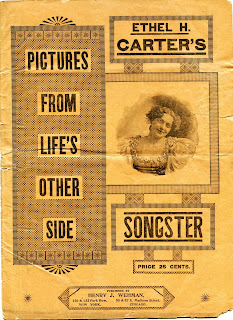More classic country gospel from the early days of electrical recording. Eight tracks this time (last time, I posted twelve)--as before, ripped and restored by me from my out-of-control collection. Digging through my old songbooks and Google-searching, I was able to find composer and year info for five of them, partial info for another, and no data at all for City of Gold and Jesus Died for Me. I must have encountered six or seven hymns entitled City of Gold, but not the one sung by Smith and Co.
Here's the song info:
Climbing Up the Golden Stairs (w: George W. Sebren; m: George W. and Arthur B. Sebren, 1905)
City of Gold
Jesus Died for Me
Are You Washed in the Blood of the Lamb (w/m: Elisha A. Hoffman, 1878)
Hold to God's Unchanging Hand (w: Jennie Wilson; m:Franklin L. Eiland, 1906)
Waiting on the Golden Shore (w: William M. Ramsey; m:?; 1916?)
Life's Railway to Heaven (w: Eliza R. Snow & M. E. Abbey; m: Charles D. Tillman, 1890)
Jesus Prayed (w: E.M. Barlett; m: J.M. Henson, 1923)
Climbing Up the Golden Stairs has no "Up" in the original title, and Jesus Prayed is actually He Prayed. The Columbia label's song research department must have been a real pro operation....
Last time, I described an "answer" chorus, but then realized that was my own personal term for gospel quartet antiphony. So I changed "answer" to "echo," a term actually used back in the day. Most of these tracks have antiphonal choruses, with the one in Jesus Died for Me especially cool (though it's kind of a rehash of the 1857 Church in the Wildwood refrain). The chorus of Waiting on the Golden Shore, meanwhile, is more complex, with its responsive singing happening in spurts, a la He Will Set Your Fields on Fire, and I'll wager I'm the first person ever to type "response singing happening in spurts." The most complex answer/echo/response/antiphonal gospel chorus I've ever heard happens on/in His Charming Love, a gospel number scheduled for a future tune, so stay posted. Er, I mean, scheduled for a future post, so stay tuned.
When my brother and I were kids, we thought "stay tuned" was a single word. And we heard it as "stachuned." We thought TV announcers were asking us to "stachuned" for The Man from U.N.C.L.E. or Green Acres. (We got the meaning, however.) Oh, and we also thought "under arrest" was a single word. As in, people getting "under-arrested." Kids. When our grandma said a cop had "pinched" her, we looked for the bruise. But back to the post....
I have a theory--merely a guess--that gospel-style antiphony is a remnant of the "fuging" sections found in late 18th-century hymns and anthems, since they do sort of function the same way. This is pure supposition on my part--hence, the preponderance of qualifiers ("merely a guess," "sort of"). Bold claims have a way of going "poof" upon closer examination, unless they're being made by Donald Trump, in which case their momentum grows the more they are refuted.
To the music: Smith's Sacred Singers, Part 2
TRACKLIST
Climbing Up the Golden Stairs--Columbia 15195-D (1927)
City of Gold--Columbia 15195-D (1927)
Jesus Died for Me--Columbia 15430-D (1929)
Are You Washed in the Blood of the Lamb--Columbia 15430-D (1929)
Hold to God's Unchanging Hand--Columbia 15308-D (1928)
Waiting on the Golden Shore--Columbia 15308-D (1928)
Life's Railway to Heaven--Columbia 15159-D (1927)
Jesus Prayed--Columbia 15159-D (1926)
Lee





